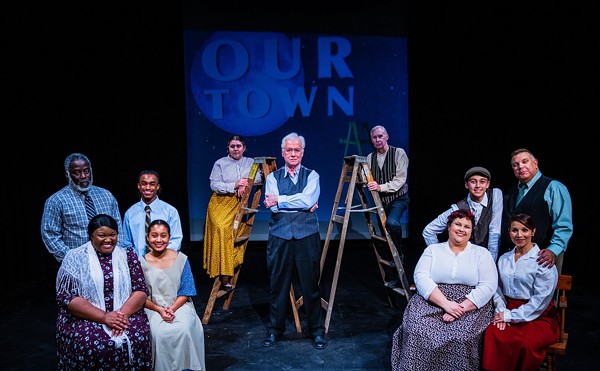
A Raisin in the Sun is a wonderful play, a central event in the struggle for African-American civil rights, and a beautiful study in humanity under pressure from without and within. Lorraine Hansberry’s classic work shows us five members of the Younger family in the bad old 1950s, when race prejudice was unembarrassed, and the white majority was content to keep the black minority in menial work and poverty. Hansberry’s Youngers refuse to accept this sorry destiny: Multi-talented Beneatha insists she’s going to become a doctor, matriarch Lena buys a house in a white area of Chicago, and nervous Walter Lee, Beneatha’s brother, attempts to follow his capitalist dream right out of the ghetto. As we see in Stageworks’ fine version of the play, things don’t work out so simply. Even if a white homeowners’ association weren’t set on keeping the Youngers from their neighborhood, there’d still be the problem of living with one another in claustrophobia-inducing close quarters. Beneatha’s problem, long before she has to face any bigoted admission officers, is her brother’s contempt; and Walter’s great obstacle, before he can open the doors of his wished-for liquor store, is his mother’s peremptory opposition. How this family manages to survive (with only momentary explosions) is the fascinating subject of Hansberry’s play, and a spectacle with which all Americans should be familiar. This is a great play, as central to our national self-understanding as is Death of a Salesman or A Streetcar Named Desire. See it and savor it. Bring the children.
The drama revolves around a life insurance check offering more money at one time than the Younger family has ever seen. What Mama will do with the $10,000 is, at first, anybody’s guess. It’s known that she wants a real house after years in a cramped apartment. But Walter wants to open his store with a couple of friends, and Beneatha needs a big part of the money for medical school. There are other complications: Ruth, Walter’s wife, is pregnant with a child she can’t afford to raise, and Beneatha is conducting a cautious romance with a Nigerian man who wants her to move to Africa. As for Walter — who hates his job as chauffeur to a white man, and who has lost respect for any value that’s not monetary — he’s on the very edge of cracking. Like the “dream deferred” in the Langston Hughes poem that provides the title of the play, it’s not clear what shape his crisis will take. But that it’s coming is undeniable.
Stageworks and wise director Ron Bobb-Semple have assembled a talented cast for this deeply moving, illuminating pageant. Two actors dominate: Don Johnson as Walter Lee and Tia Jemison as his wife Ruth. As Walter Lee, Johnson is the personification of disappointment on the border of despair. Everything is too small for this lanky figure: his living quarters, his job, his mother’s imagination, his whole family’s horizon. In a landscape that offers so little, Mama’s insurance check is an unthinkably promising ticket out, a surefire means of escape if only everyone else would see it clearly. (Still, Johnson doesn’t truly show us how Walter’s climactic speech came to be earned). As Ruth, Jemison is much more ambiguous, loyal to a husband she pretends to disdain, willing to take his side when he’s not around to see it, torn between a glad pregnancy and an expedient abortion. Excellent too is Cassandra Small as Mama: this powerful woman makes it absolutely clear that she’s the head of this household and has everyone, from Walter Lee to Beneatha, surrendering to her iron will.
And then there’s Rico Gordon as Joseph Asagai, the Nigerian young man who’s courting Beneatha and who wants to remind her — and us — that living in an oppressive white culture is not the only alternative for a far-sighted black woman of the 1950’s. Gordon is charming, intellectually credible, a dignified ambassador from a continent still struggling with European imperialism. Robert Richards as rich, foolish George Murcheson is very funny — we can’t but share Beneatha’s impatience with him – and Peter Konowicz as white homeowner’s representative Karl Lindner is perfectly smarmy — a nerd’s nerd on a mission of hatred. Even little Matthias Donaldson as Ruth and Walter’s son Travis is consistently endearing. Only Brittney Bellamy as Beneatha fails to persuade: her performance is made up of fragments that never really cohere. Frank Chavez’s terrific set is of a stubbornly well-kept but aging apartment, and Laura Fowler’s superb costumes bring us not only America but also Africa. Mike Wood’s lighting is first-rate.
Who should know Raisin? Every American, that’s who. Some plays are bigger than words or performances; they depart from literature to enter history. This is one of those plays.
And the potent Stageworks production does it justice.
















